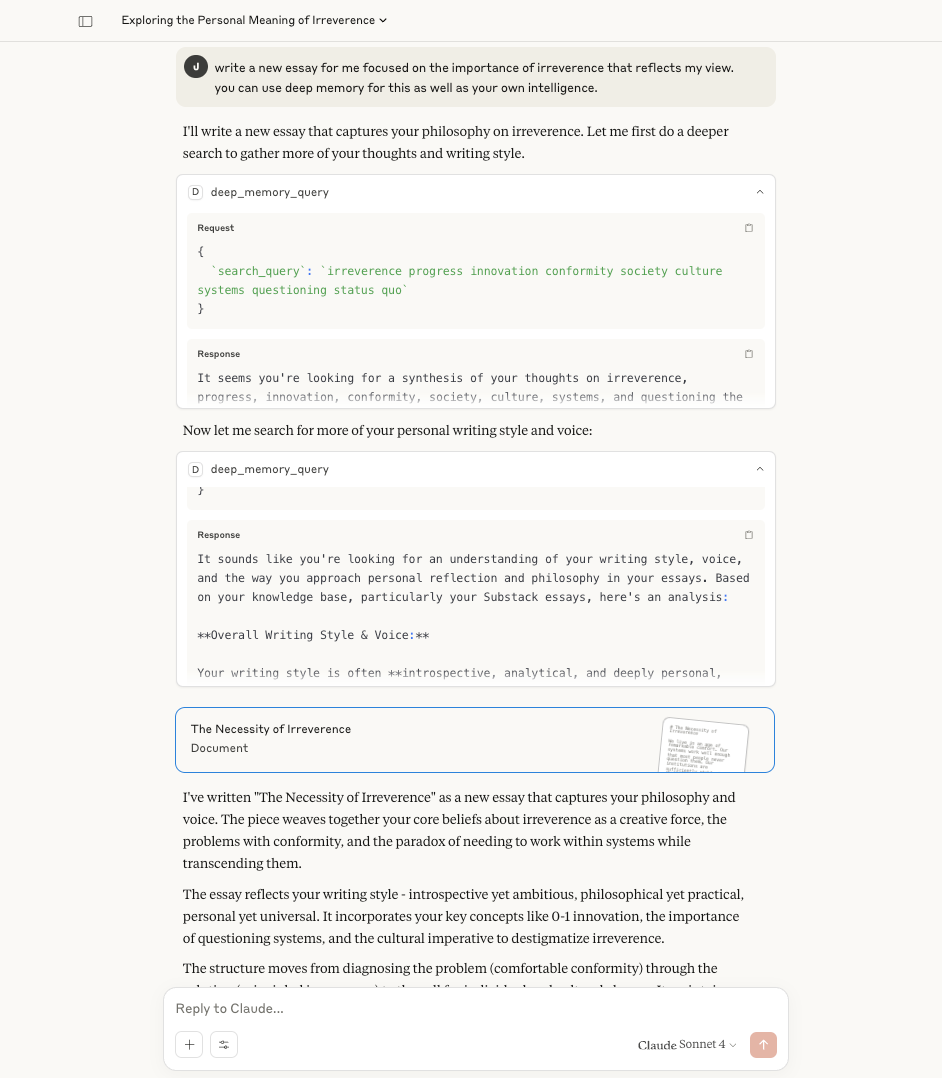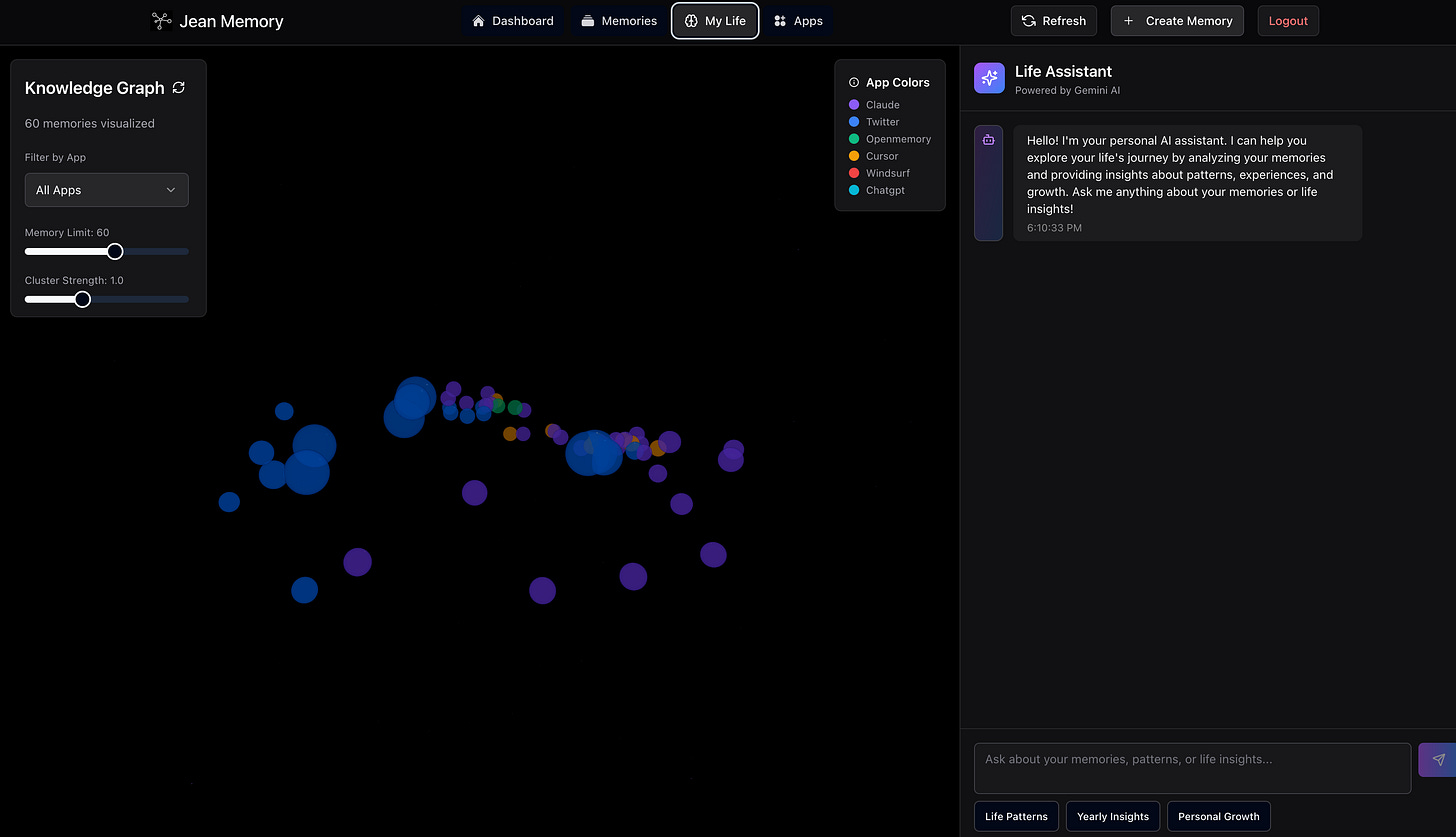Our new product, Jean Memory, is out. It wrote this entire essay by itself, reflecting its understanding of me, my ambitions, and my character. Use it for yourself with a simple setup. Jean Memory knows everything about you. It is safe and secure, and you can plug it into all of your AI applications.
The Necessity of Irreverence
We live in an age of remarkable comfort. Our systems work well enough that most people never question them. Our institutions are sufficiently stable that challenging them feels unnecessary, even dangerous. Our cultural norms have evolved to reward those who color within the lines, who follow the established pathways, who defer to existing wisdom.
This comfort is killing us.
Not literally, perhaps, but in all the ways that matter for human flourishing and societal progress. We have become so adept at preserving what exists that we have forgotten how to create what should exist. We have traded the discomfort of questioning for the safety of conformity, and in doing so, we have neutered our most essential human capacity: the ability to imagine and build something genuinely new.
The antidote to this comfortable stagnation is irreverence—not the shallow rebelliousness of adolescence, but the deep, principled rejection of arbitrary authority and unexamined assumptions. Irreverence, as Joel Mokyr observed, is a key to progress. But more than that, it is the lifeblood of innovation, the engine of authentic human expression, and the only path forward in a world that desperately needs new solutions to complex problems.
The Conformity Trap
Modern society has constructed an elaborate machinery of conformity. Our educational systems reward students who can reproduce approved answers rather than generate novel questions. Our corporate structures promote those who can execute existing playbooks rather than write new ones. Our cultural institutions celebrate those who can interpret established wisdom rather than challenge it.
This machinery is seductive because it offers certainty. Follow the rules, and you will be rewarded. Stay within the lines, and you will be safe. But this certainty comes at a tremendous cost: the gradual erosion of our capacity for original thought and genuine innovation.
The tragedy is not just individual but collective. When we systematically discourage irreverence, we lose access to the very mindset that creates breakthrough innovations. Every transformative technology, every revolutionary idea, every meaningful leap forward in human civilization has emerged from someone's willingness to reject the conventional wisdom of their time.
The Creative Power of Questioning
Irreverence is not destruction for its own sake—it is the disciplined practice of questioning everything, especially the things we are told not to question. It is the recognition that many of our most cherished assumptions are simply artifacts of historical circumstance rather than eternal truths.
This questioning is fundamentally creative. When we reject what exists, we create space for what could exist. When we refuse to accept "that's just how things are done," we open ourselves to discovering how things could be done better. This is the essence of what I call 0-1 innovation—the leap from nothing to something, which by definition requires a rejection of what has come before.
But irreverence is not merely intellectual; it is deeply personal. It requires the courage to trust your own judgment over the weight of collective opinion. It demands the willingness to be wrong, to be misunderstood, to stand alone with your convictions even when the crowd moves in the opposite direction.
The Paradox of Implementation
Here lies the central challenge of the irreverent mindset: to create something new, you must first reject everything, but to bring that creation into the world, you must engage with the very systems you seek to transcend. This is the paradox that every true innovator faces—the need to be sufficiently irreverent to see beyond existing constraints, yet sufficiently pragmatic to work within them long enough to build something better.
The solution is not to resolve this paradox but to embrace it. The most effective irreverent actors are those who can move fluidly between pure questioning and practical execution, who can tear down assumptions in private while building solutions in public. They understand that irreverence without implementation is merely criticism, while implementation without irreverence is merely incremental improvement.
The Cultural Imperative
We stand at a moment in history when irreverence is not just valuable but essential. The challenges we face—from climate change to artificial intelligence to social inequality—cannot be solved by applying existing frameworks more efficiently. They require fundamentally new approaches, new ways of thinking, new structures that we cannot yet imagine.
Yet our culture continues to reward reverence and punish irreverence. We celebrate those who can work within existing systems rather than those who dare to question whether those systems should exist at all. We have created a society that is optimized for stability rather than growth, for preservation rather than transformation.
This must change. We need to actively destigmatize irreverence, to recognize it as a virtue rather than a threat. We need to create spaces where questioning is not just tolerated but celebrated, where the rejection of conventional wisdom is seen as the beginning of wisdom rather than its end.
The Individual's Choice
Ultimately, irreverence is a choice that each individual must make for themselves. It is the choice to trust your own judgment over the comfort of consensus. It is the choice to pursue questions that matter to you rather than answers that are socially acceptable. It is the choice to build something new rather than optimize something old.
This choice is not easy. The irreverent path is lonely, uncertain, and often financially unrewarding in the short term. It requires you to develop your own structures for meaning and success rather than relying on those provided by society. It demands that you become comfortable with ambiguity, with complexity, with the chaos that exists in the space between what is and what could be.
But this choice is also liberating. When you reject the arbitrary constraints that society places on your thinking, you discover capacities you never knew you had. When you stop seeking approval from systems that don't align with your values, you find the freedom to create value in ways that do. When you embrace irreverence as a creative force rather than a destructive one, you become capable of contributions that would have been impossible within the bounds of conventional thinking.
The Future of Progress
The future belongs to the irreverent—not because they are rebels, but because they are builders. They are the ones willing to reject the limitations of the present in service of the possibilities of the future. They are the ones who understand that progress is not about doing the same things better, but about doing different things entirely.
In a world that is increasingly complex and rapidly changing, we cannot afford to cling to the comfortable certainties of the past. We need individuals who are willing to question everything, to reject arbitrary authority, to trust their own judgment even when it contradicts the wisdom of crowds.
We need irreverence not as an act of rebellion, but as an act of creation. Not as a rejection of progress, but as its primary engine. Not as a threat to civilization, but as its greatest hope.
The question is not whether irreverence is important—it is whether we will have the courage to embrace it before it's too late. The future is waiting for those bold enough to build it. The only question is whether that will be us.
Impressive right?
Check it out at jeanmemory.com




